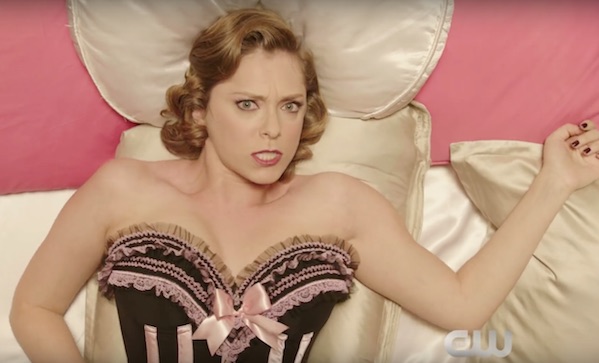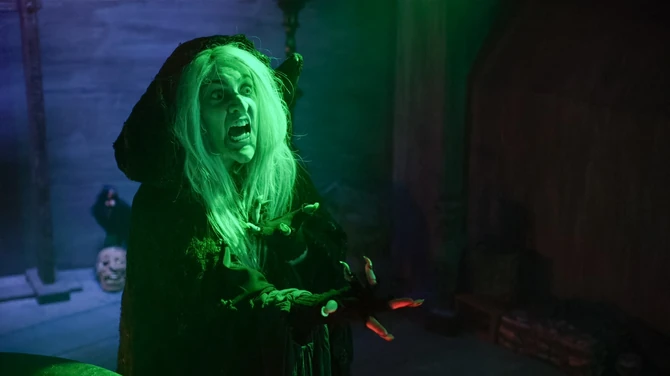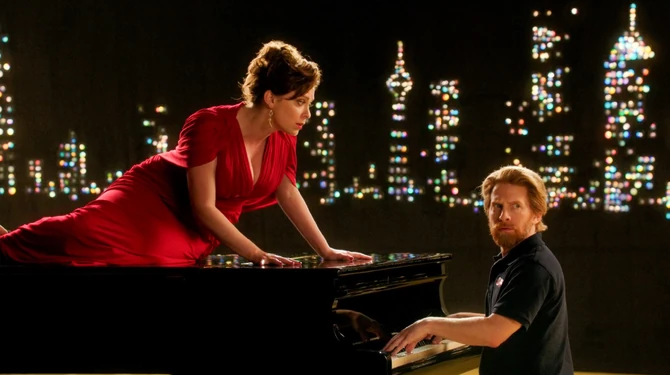This article was co-written with Laura Markus (lauraloo77)!
Characters are supposed to grow. That's rule 1 (although, like in Doctor Who, there are a lot of rule ones in TV) of good storytelling. It's even the premise of this article series. Good television, a lot of the time, is predicated on watching fascinating, messy, conflicted people learn to be a little bit better in some way.
You wouldn't expect to find one of TV's most compelling anti-heroes in a musical comedy on the CW, but the world is full of surprises. The title of the show, Crazy Ex-Girlfriend, keys you into what to expect from the lead character, and those expectations might take the form of caricature. The term 'crazy ex-girlfriend' is one that can come bound up with all sorts of misogynist connotations, and that, therefore, might be viewers' first impression of its lead character, Rebecca Bunch. This also leads to many viewers being hesitant to even try out the show due to its title and the connotations of such language. However, the writers and Rebecca herself are quick to put these fears to rest and are in on the stigma surrounding many sexist terms and ideologies.
This is a show by feminists and for feminists as “crazy” as that may seem. Therefore, the principle aim of the show, in a sense, is to deconstruct and interrogate every aspect of that loaded term.
Admittedly, Rebecca is, in many ways, a crazy ex-girlfriend. The whole premise rests on her ditching her high-flying life in New York on a one sided crush while in total self-denial. Season one ends with her admitting this truth, in a frenzy, to Josh, the object of her fascination, but not always. Rebecca put Josh on such a high totem pole that it was nearly impossible for him to ever meet her standards. And we see the reason for this too. It was that time as summer camp where she was with Josh and that’s apparently the last time she felt truly happy. Season one is all about thinking back to when the characters were at their happiest. This just happened to be the setting for Rebecca.
Admittedly, Rebecca is, in many ways, a crazy ex-girlfriend. The whole premise rests on her ditching her high-flying life in New York on a one sided crush while in total self-denial. Season one ends with her admitting this truth, in a frenzy, to Josh, the object of her fascination, but not always. Rebecca put Josh on such a high totem pole that it was nearly impossible for him to ever meet her standards. And we see the reason for this too. It was that time as summer camp where she was with Josh and that’s apparently the last time she felt truly happy. Season one is all about thinking back to when the characters were at their happiest. This just happened to be the setting for Rebecca.
 Contrarily, season two sees Josh ditch her on the day of her wedding, and then for Rebecca to vow revenge in a way that I can only describe as deeply worrying. From those big markers of her development, you'd think she fits that caricatured bill quite easily. But at the same time, you understand where she is coming from. This was another instance of her starting to feel truly happy. No, not on the weeks leading up to her marriage, but before that. She was with Dr. Akopian and she was finally ready to start taking the steps to address her problems head on, as will be mentioned later. But it’s only when she starting questioning herself again did these doubts start swarming her head.
Contrarily, season two sees Josh ditch her on the day of her wedding, and then for Rebecca to vow revenge in a way that I can only describe as deeply worrying. From those big markers of her development, you'd think she fits that caricatured bill quite easily. But at the same time, you understand where she is coming from. This was another instance of her starting to feel truly happy. No, not on the weeks leading up to her marriage, but before that. She was with Dr. Akopian and she was finally ready to start taking the steps to address her problems head on, as will be mentioned later. But it’s only when she starting questioning herself again did these doubts start swarming her head.Rebecca has an idealized version of happiness where she thinks Josh is the person to fill that void. She tries to deny it after the setback they faced in early season two, but it’s always there. You may recall that time she kissed Valencia at the club. The show used it as a premise for a Katy Perry “I Kissed A Girl” type deal where we see Rebecca kissing another woman as “Feeling Kinda Naughty”. Valencia is quick to think it’s something she did, but many viewers read into it as Rebecca wanting to see if the object of Josh’s affections could also bring her that happiness.
This may stem from another issue of internalized biphobia from Rebecca herself (later brought on by her mom pestering her if she’s in fact gay), but that’s another theory for another day. When all's said and done, Rebecca believes in Josh more than she believes in herself. And she believes even just being around him is the key to solving everything, showing her tendency to constantly put the impetus for changing her life for the better in the hands of people who simply cannot be relied upon. Season three may break down that barrier once and for all. Who can say?
But it's in between those markers where Rebecca becomes a truly fascinating character worthy of reams of analysis of a depth I can't hope to provide. Rebecca's desires are painfully simple, and painfully sympathetic: she just wants to be loved in some way, and to love in return. That's not crazy. When you call her crazy, you're just calling her in love. It's just that a lifetime of watching reality-warping rom-coms and a mental condition that she seems frightened of tackling head on end up translating those desires into those chaotic outcomes.
But it's in between those markers where Rebecca becomes a truly fascinating character worthy of reams of analysis of a depth I can't hope to provide. Rebecca's desires are painfully simple, and painfully sympathetic: she just wants to be loved in some way, and to love in return. That's not crazy. When you call her crazy, you're just calling her in love. It's just that a lifetime of watching reality-warping rom-coms and a mental condition that she seems frightened of tackling head on end up translating those desires into those chaotic outcomes.
You have to wonder at some points if she really does take them for granted. Just like any other human could lack appreciation for the people in their life. But for season three to focus on her dynamics with each of these women, and the others in her life, would be everything. Her unhealthy/healthy/unhealthy again/healthy again relationships with both Paula and Valencia, while immensely entertaining to watch, are some of the most interesting and layered pairings on the show. And then you have her workings with Heather, who could’ve easily been written to just be the creepy neighbour next door leeching off of Rebecca for information and test subjects for her Psych class, as so much more than that.
In fact, the situation is a lot more nuanced than even that. It has to be considered that Rebecca is our protagonist. The majority of the show's musical numbers are, essentially, making her thought processes entertaining and emotional, so we know far more about her than any other character on the show. The problem is that Rebecca doesn't seem to know, or want to know, that much about herself. Time and time again, she shies away from doing the right thing, or getting in touch with her emotions, and instead chooses the next mildly illegal scheme of the day to perpetuate the fantasies that seem such a tempting, and far less messy, substitute for real life.
In fact, the situation is a lot more nuanced than even that. It has to be considered that Rebecca is our protagonist. The majority of the show's musical numbers are, essentially, making her thought processes entertaining and emotional, so we know far more about her than any other character on the show. The problem is that Rebecca doesn't seem to know, or want to know, that much about herself. Time and time again, she shies away from doing the right thing, or getting in touch with her emotions, and instead chooses the next mildly illegal scheme of the day to perpetuate the fantasies that seem such a tempting, and far less messy, substitute for real life.
When Rebecca backs out of a productive therapy session to instead dive back into her toxic relationship with Josh, it's hard to sympathise with her. When she settles into that stable relationship, but finds herself tempted by the next exciting thing, her unavailable, douchebag boss Nathaniel, it's even harder. Sometimes Rebecca, our eyes and ears into the weird world of the show, seems a million miles away from us.
The result of that is a fascinating push and pull that defines the show. It's impossible to ever perceive Rebecca one way, because she never conforms to the archetype of the hero or villain of the story for too long, ironically for someone obsessed with black-and-white storytelling. Sometimes, we're Dr Akopian, rooting for Rebecca to get to the bottom of her mental turmoil and finally make decisions that are good for her, away from the pinball game between men, all of whom don't seem to provide the ticket to a healthy life.
The result of that is a fascinating push and pull that defines the show. It's impossible to ever perceive Rebecca one way, because she never conforms to the archetype of the hero or villain of the story for too long, ironically for someone obsessed with black-and-white storytelling. Sometimes, we're Dr Akopian, rooting for Rebecca to get to the bottom of her mental turmoil and finally make decisions that are good for her, away from the pinball game between men, all of whom don't seem to provide the ticket to a healthy life.
And other times, we're Paula from season one, egging Rebecca on, wanting her to win no matter how many lives she treads on and no matter how far she distances herself from happiness. Frequently, as in those final moments of season two where she's simultaneously sympathetic and terrifying, we're both. Perhaps the most important thing to note is that not every protagonist has to be likeable in every moment of their lives. Viola Davis says it best when she asks the audience why Annalise always has to be likeable. Is “likeable” the first descriptor that pops into your head when you think of characters like Walter White or any other seminal anti-hero from our time?
The idea that all women, especially working women, have to be likeable or have to constantly try to please their bosses by not making any trouble is exactly the kind of sexist agenda that Crazy Ex-Girlfriend fights to perpetrate each episode.
Rachel and Aline Brosh McKenna (the other showrunner/creator) have said that season one featured Rebecca joining the city of West Covina and drastically changing the lives of everyone there. Her being there created a ripple effect of her taking a look at her life, and then everyone else doing the same. She got Darryl to take a look at himself and his marriage, Greg to really view his alcoholism, Josh and Valencia to see that they weren’t a dream couple and were in fact unhappy, and more. She sparked a change within everyone just by being there.
Rachel and Aline Brosh McKenna (the other showrunner/creator) have said that season one featured Rebecca joining the city of West Covina and drastically changing the lives of everyone there. Her being there created a ripple effect of her taking a look at her life, and then everyone else doing the same. She got Darryl to take a look at himself and his marriage, Greg to really view his alcoholism, Josh and Valencia to see that they weren’t a dream couple and were in fact unhappy, and more. She sparked a change within everyone just by being there.
And one could correctly assume that she would then make the same changes and magnifications on her own life. Season two, on the other hand, showed more and more people getting more comfortable with who they are, even though, for some, finding out who they really are is making them even more uncomfortable. And they accomplished all of this without Rebecca, going so far as to even push forth the narrative that they are moving on from Rebecca.
None of this would work without a good actress to embody her, and in Rachel Bloom, Rebecca truly comes to life. Bloom's insight into the character, as both writer and performer, is evidently deeper and more detailed than any viewer of the show could rival, and that's reflected in the effortlessly deft way in which she makes Rebecca funny, sad, scary and pitiful all at once in any given scene.
None of this would work without a good actress to embody her, and in Rachel Bloom, Rebecca truly comes to life. Bloom's insight into the character, as both writer and performer, is evidently deeper and more detailed than any viewer of the show could rival, and that's reflected in the effortlessly deft way in which she makes Rebecca funny, sad, scary and pitiful all at once in any given scene.
It also helps that she is, apparently, quite good at signing, and brings powerful emotion and humour to any number thrown at her, whether it's the heartfelt emotionality of 'You Stupid Bitch' or the death metal (it's that kind of show) of 'What a Rush to be a Bride'. I'd say 'give her all of the awards', but she already won a Golden Globe. I guess it's worth asking if she can win some more.
And with the creators' four-year plan only halfway through, it will be compelling to see just which way Rebecca will turn in her topsy-turvy, intermittent, sometimes backwards march towards happiness, if there is such a thing.
And with the creators' four-year plan only halfway through, it will be compelling to see just which way Rebecca will turn in her topsy-turvy, intermittent, sometimes backwards march towards happiness, if there is such a thing.





